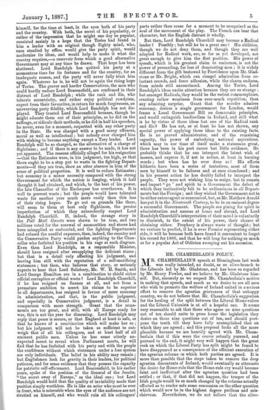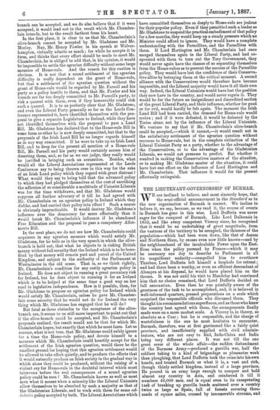MR. CHAMBERLAIN'S POLICY.
MR. CHAMBERLAIN'S speech at Birmingham last week was really intended, no doubt, as an olive-branch to the Liberals led by Mr. Gladstone, and has been so regarded
by Mr. Henry Fowler, and we believe by Mr. Gladstone him- self. But, sincerely as we respect Mr. Chamberlain's motive in making that speech, and much as we desire to see all men who wish to promote the welfare of Ireland united in a serious effort to remove the agrarian grievances of that unhappy country, we do not believe that Mr. Chamberlain's suggestion for the healing of the split between the Liberal Home-rulers and the Liberal Unionists is at all a hopeful one. It seems very reasonable to ask that those who agree on nine questions out of ten should unite to press home the legislation they desire on those nine questions out of ten, and should post- pone the tenth till they have fully accomplished that on which they are agreed ; and this proposal looks all the more plausible because we are heartily agreed with Mr. Cham- berlain that if this were the course actually pursued, and pursued to the end, it might very well happen that the great rock on which the Liberal Party has split might be found to have disappeared as a consequence of the efficient execution of the agrarian reforms on which both parties are agreed. It is more than possible that the steps taken to remove the deep agrarian discontents of Ireland, would eventually so attenuate the desire for Home-rule that the Home-rule cry would become faint and ineffectual after the agrarian question had been settled ; or that, if that did not happen, the temper of the Irish people would be so much changed by the reforms actually effected as to render safe some concession on the other question which would now be in the highest degree perilous and mis- chievous. Nevertheless, we do not believe that the olive- branch can be accepted, and we do also believe that if it were accepted, it would lead not to the result which Mr. Chamber- lain intends, but to the result farthest from his heart. In the first place, it is clear to us that Mr. Chamberlain's olive-branch cannot be accepted by Mr. Gladstone and Mr. Morley. Nay, Mr. Henry Fowler, in his speech at Wolver- hampton, virtually admits as much; for while he accepts it in form, and thinks that every effort should be made to meet Mr. Chamberlain, he is obliged to add that, in his opinion, it would be impossible to settle the agrarian difficulty without some large measure of Home-rule. And the reason for this caution is
obvious. It is not that a sound settlement of the agrarian difficulty is really dependent on the grant of Home-rule, but that a settlement of the agrarian question without the grant of Home-rule would be regarded by Mr. Parnell and his party as a policy hostile to them, and that Mr. Fowler and his friends are far too deeply committed to Mr. Parnell's party, to risk a quarrel with them, even if they honourably could risk such a quarrel. It is to us perfectly clear that Mr. Gladstone, and even the Liberal Party generally so far as the Leeds Con- ference represented it, have identified themselves with the pro- posal to give a separate Legislature to Ireland, while they have not identified themselves with the proposal to pass a Land Bill. Mr. Gladstone has declared that to the Home-rule Bill in some form or other he is now deeply committed, but that to the proposals of the Irish Land Bill he no longer regards himself as in any way committed. If he were to take up an Irish Land Bill, and to drop for the present all mention of a Home-rule Bill, Mr. Parnell and his party would certainly accuse him of deserting them, and, so far as we can judge, they really would be justified in bringing such an accusation. Besides, what would all the Liberal Associations represented at the Leeds Conference say to being thrown over in this way for the sake of an Irish Land policy which they regard with great distrust ? What would they say to being told that the advanced policy to which they had pledged themselves at the cost of sacrificing the adhesion of so considerable a multitude of Unionist Liberals was for the time withdrawn, and that Mr. Gladstone would suppress all further advocacy of it till he had agreed with Mr. Chamberlain on an agrarian policy in Ireland which they dislike, and had carried that policy into effect ? Such a course is obviously impracticable. It would destroy Mr. Gladstone's influence over the democracy far more effectually than it would break Mr. Chamberlain's influence if he abandoned Free Education and the proposal to pass a compulsory Allot- ments Bill.
In the next place, we do not see how Mr. Chamberlain could acquiesce in any agrarian measure which would satisfy Mr. Gladstone, for he tells us in the very speech in which the olive- branch is held out, that what he objects to is risking British money without full security that the Ireland which is to be bene- fited by that money will remain part and parcel of the United Kingdom, and subject to the authority of the Parliament at Westminster in the old sense. That is, as we think rightly, Mr. Chamberlain's condition for any costly agrarian policy in Ireland. He does not object to running a great pecuniary risk for Ireland, but he does object to running it for an Ireland which is to be helped at the same time a good way on her road to legislative independence. How is it possible, then, for Mr. Gladstone to propose an agrarian policy for Ireland which would satisfy Mr. Chamberlain, unless he gave Mr. Chamber- lain some security that he would not do for Ireland the very thing which Mr. Gladstone has engaged that he will do ?
But fatal as these obstacles to the acceptance of the olive- branch are, it seems to us still more important to point out that if the olive-branch could be accepted, and Mr. Chamberlain's proposals realised, the result would not be that for which Mr. Chamberlain hopes, but exactly that which he most fears. Let us assume, what is not true, that Mr. Gladstone could safely ignore for a time the Home-rule policy, and devote himself to a measure which Mr. Chamberlain could heartily accept for the settlement of the Irish agrarian question, would there be the smallest ground for hoping that this agrarian settlement would be allowed to take effect quietly, and to produce the effects that it would naturally produce on Irish society in the gradual way in which alone they could be produced, without the raising of a violent cry for Home-rule in the doubtful interval which must intervene before the real consequences of a sound agrarian policy could be seen ? Mr. Chamberlain knows as well as most men what it means when a minority like the Liberal Unionists allow themselves to be absorbed by such a majority as that of the Gladstonian Liberals, and to work with them for some ad- interim policy accepted by both. The Liberal Associations which have committed themselves so deeply to Home-rule are jealous for their popular policy. Even if they permitted such a leader as Mr. Gladstone to suspend the practical embodiment of that policy for a few months, they would keep up a steady pressure which no Minister could afford to ignore. They would have a complete understanding with the Parnellites, and the Parnellites with them. If Lord Hartington and Mr. Chamberlain had once merged themselves again in the Liberal Party, and had co- operated with them to turn out the Tory Government, they would never again have the chance of so separating themselves from the Home-rulers as to prevent the success of the Parnellite policy. They would have lost the confidence of their Conserva- tive allies by betraying them at the critical moment. A second alliance with the Conservatives would therefore have become impossible, and the Liberal majority would have it all their own way. Indeed, the Liberal Unionists would have lost the position they now have in the country, and would never regain it. They would be for the future an insignificant and discredited section of the great Liberal Party, and their influence, whether for good or for evil, would hardly be felt again. The moment the Irish Land Bill had been carried, the demand for Home-rule would revive ; and if it were defeated, it would be defeated by the Tories alone, not by the influence of the Liberal Unionists. Wo venture to say that if Mr. Chamberlain's olive-branch could be accepted,—which it cannot,—it would result not in the satisfactory settlement of the agrarian question without recourse to Home-rule, but in the complete extinction of the Liberal Unionist Party as a party, whether to the advantage of the Conservatives, or to the advantage of the Gladstonian Liberals, we would not presume to predict. But whether it resulted in making the Conservatives masters of the situation, or in making Mr. Gladstone master of the situation, it could have but one effect on the influence of Lord Hartington and Mr. Chamberlain. That influence it would for the present effectually extinguish.















































 Previous page
Previous page